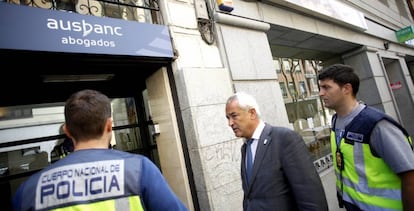Banks stop paying consumer group after leader held on extortion charges
For years, Luis Pineda asked lenders to take out expensive ads or face negative magazine coverage

Following the arrest last week of a consumer association chief on extortion charges, most of Spain’s major banks have canceled the advertising they had taken out in the group’s financial publications.
Except for BBVA, Bankinter and Caja Madrid, which refused to deal with the company, many Spanish lenders have spent years paying Ausbanc, a financial consumer association, to avoid a smear campaign that could have ruined their business.
Infanta trial not affected
The ongoing investigation into Manos Limpias will not affect the Noos trial, at least not for the moment, legal sources said.
It was this group that brought the private prosecution that forced Cristina de Borbón to take the stand for tax fraud as part of a larger probe into her husband's shady business dealings.
Manos Limpias leader Miguel Bernad, who was arrested on Friday on extortion charges, is believed to have demanded three million euros from the royal’s defense in order to drop the accusation against her.
Legal experts said that Manos Limpias cannot be expelled from the case despite its leader’s arrest. The High Court judge investigating Bernad has no plans to place the union’s activities on hold, these same sources said.
The princess’s lawyer, Miguel Roca, reported the extortion attempt to the police.
Banco Santander, CaixaBank, Bankia, Banco Sabadell, Banco Popular and several smaller savings banks all admitted that they had ended their commercial relations with Ausbanc following the arrest.
Ausbanc president Luis Pineda was detained on Friday along with Miguel Bernad, the head of Manos Limpias (Clean Hands), an obscure far-right labor union known for bringing private prosecutions against high-profile individuals, ranging from former High Court Judge Baltasar Garzón to Spanish royal Cristina de Borbón.
Both men are believed to have been lodging complaints against individuals, institutions and businesses and then demanding money in return for withdrawing legal action, according to judicial sources. In Ausbanc’s case, Pineda asked lenders to take out expensive ads or face a storm of negative stories.
The suspects, who are longtime friends and politically on the far right, are being investigated for extortion, subsidy fraud, tax crimes, money laundering and criminal association.
Threatening letters
EL PAÍS has had access to letters in which Pineda asked banks to take out advertising in his magazines, arguing that judges “who slap people with fines” were contributing writers. On several occasions, he threatened communications department managers with sending negative reviews about their own work to their superiors.
No Ausbanc representative could be reached for comment.
“Give me €300,000 or I’ll sink your firm”
Ausbanc president Luis Pineda asked the head of CréditServices for €300,000 a year in exchange for changing its negative coverage of the debt consolidation company following a complaint by an Ausbanc member.
The money would go toward “advertising, subscriptions and protocol,” according to secret recordings of the conversations between Pineda and CréditServices chief Javier López.
EL PAÍS has accessed passages of the recordings, made by López at two of the three meetings he had with Pineda between 2005 and 2006 to try to stop the negative campaign.
“He told me that either I gave him the €300,000 or he could sink my business,” says López. “I walked out of his office in shock. I talked about what happened with people in banking, and they told me to be careful with him because he was doing the same with other lenders.”
Pineda’s letters to lenders reflect a variety of veiled threats. When the financial crisis hit in 2008, some banks were told that “the situation is difficult, but nothing that cannot be resolved with perseverance and a bit of magic, with our help.”
And if the “magic” did not work, Pineda raised the tone. In one letter he noted, “just to show you my teeth,” that he had hired a New York attorney “who is used to slapping banks there with multi-million-dollar fines.”
Other times, Pineda met with the bank’s communications chief and produced a magazine issue with the bank on the cover and a laudatory story inside. “This is not for free,” he told one bank employee who refused to use his name. When the executive noted that the bank did not pay for information, Pineda allegedly replied: “Information? You’ll see that the story can turn out to be very different if you don’t cooperate.”
Besides Spanish publications like Mercado de dinero (Money market) or Dinero y salud (Money and health), Pineda had magazines in Britain, Venezuela, Colombia and Miami.
Sources consulted for this story said they were never asked to pay in cash. Everything was invoiced through the companies that Ausbanc had set up for that purpose, including travel agencies, event organizers, legal assistance departments and the magazines themselves.
Ausbanc was flexible with contributions, allowing clients to pay a fixed annual amount or make sporadic payments, to take out ads (at around €5,000 per page) or to hire events.
English version by Susana Urra.
Tu suscripción se está usando en otro dispositivo
¿Quieres añadir otro usuario a tu suscripción?
Si continúas leyendo en este dispositivo, no se podrá leer en el otro.
FlechaTu suscripción se está usando en otro dispositivo y solo puedes acceder a EL PAÍS desde un dispositivo a la vez.
Si quieres compartir tu cuenta, cambia tu suscripción a la modalidad Premium, así podrás añadir otro usuario. Cada uno accederá con su propia cuenta de email, lo que os permitirá personalizar vuestra experiencia en EL PAÍS.
¿Tienes una suscripción de empresa? Accede aquí para contratar más cuentas.
En el caso de no saber quién está usando tu cuenta, te recomendamos cambiar tu contraseña aquí.
Si decides continuar compartiendo tu cuenta, este mensaje se mostrará en tu dispositivo y en el de la otra persona que está usando tu cuenta de forma indefinida, afectando a tu experiencia de lectura. Puedes consultar aquí los términos y condiciones de la suscripción digital.









































